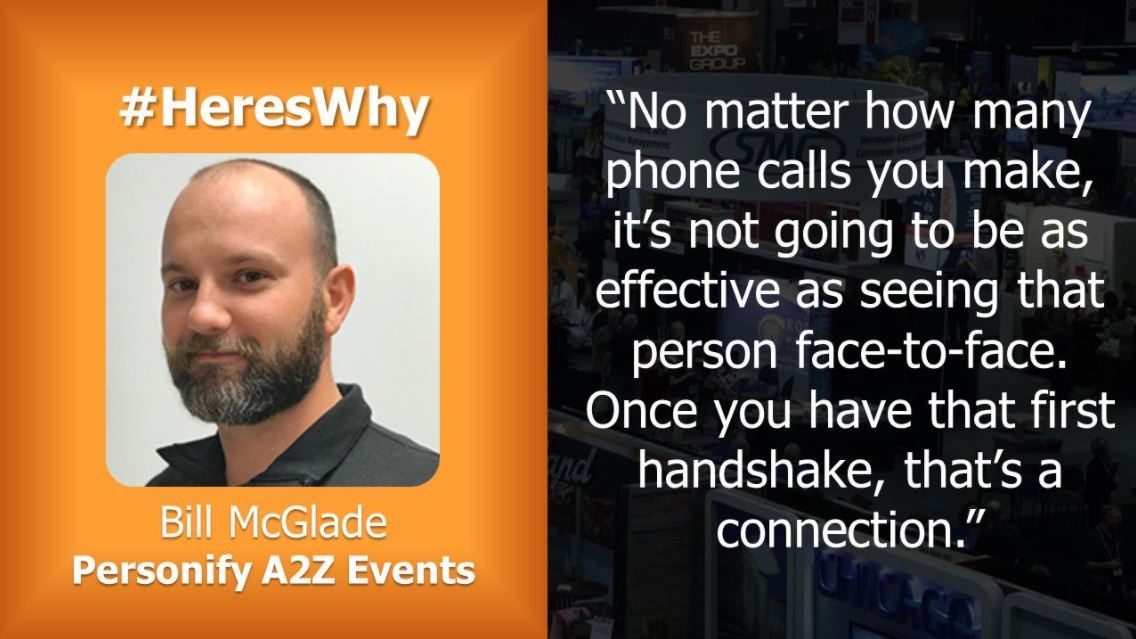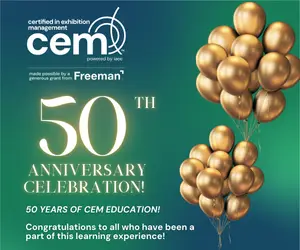
In the latest installment of our #HeresWhy Q&A sessions, we interviewed Bill McGlade, Vice President of Account Management at Personify A2Z Events:
Tell us about your work. What do you do at A2Z?
My current role is Vice President of Account Management at Personify A2Z Events. Each day, I work with my team of five to ensure we’re making our clients happy and that they’re using our software effectively and efficiently. Sales also play a big role, so we first seek to clearly define our clients’ goals, so we can identify which solution will work for them or connect them with one of our partners that can support their organizational and event goals. The key is not forcing our solution on our clients, but ensuring their goals are being met for their organization and event.
A2Z was acquired by Personify in November, and we’re fully adopting the One Company mindset. A2Z itself was in the events industry for 21 years, and I’m proud to work for a company that was an integral part of the industry, especially during the recent economic ups and downs. Personify has also been in the industry for 20 years, so there’s a rich history on both sides and I’m looking forward to what’s to come.
Value is something everyone is constantly seeking and trying to maximize in this industry. In your opinion, what are some of the intangibles from the events industry that other marketing channels can’t replicate?
There are many different platforms and areas to market software and services. When it comes to face-to-face, this is always the most successful, and that’s what drives my passion for the industry. No matter how many phone calls you make, it’s not going to be as effective as seeing that person face-to-face. Once you have that first handshake, that’s a connection. When you make that connection, that’s when you can actually build that trust. This goes back to people craving to be with other people, to work with those they trust. In order to do that, you must be face-to-face with them. It’s sociology as well as neuroscience.
I’ve also experienced this from a personal standpoint. When I began working with A2Z, we didn’t use video chat regularly with clients like we do now. So, when I would meet clients for the first time at events, I would always hear “Wow, I thought you were much older.” Being together in person changes people’s perspectives and allows them to better understand who you are. It also calms everyone down. For example, if you only had phone conversations with clients, emotions can run rampant. But when you’re in person together, those emotions are tempered, allowing us to drill down to what they really want to solve.
You’ve taken up the ambassador torch in multiple ways, both when you were at ISA and now at A2Z. Why are you passionate about being involved in the industry?
The industry embodies who I am as a person. A lot of times when people think business, they think Wall Street and everyone’s out for themselves. Our business is not that way. Our business is about people. Being in a business that’s about people, helping to solve their problems and meet their business needs, aligns with my core values.
I’ve worked in other industries, and I can’t say the same thing. None of them have the same passion that people in this industry do. Positive vibes are a real thing, and trade shows are full of positive vibes for the most part. People come together in the trade show environment, and it also keeps them going. It’s like osmosis.
Are there any particular topics or issues within the industry that you’re passionate about?
I focus on things that are going to negatively impact the business of events. There are some things on the social side that trigger a response from me, but my advocacy efforts largely focus on the business aspects of the industry. Two issues I’m still pushing for right now are infrastructure investment, especially as it relates to improved airports, and online booking scams.
You’ve worked with a lot of young professionals through the IAEE DC Young Professionals Committee and the IAEE National Young Professionals Committee. From your perspective, how does the younger generation differ in advocacy from older generations?
History kind of repeats itself. My generation and the generation right after me are a bit more involved in politics than previous generations. I’ll refer to it as the 60’s come-again. That’s when free speech was a big aspect of advocating, as well as positive and peaceful protesting. Right now, there’s a political environment that’s bringing out more of those advocates again to make sure American values are still intact.
We’re starting to see more of an influx of those individuals in the industry and they’re wanting to get involved. They realize their voice can be heard, especially by going to things like Exhibitions Day on Capitol Hill. Some of the older generations have been through life and experiences that lend them to think they can’t change anything. The younger generation still has that hope, and the influx of hope is a good thing for us.
A lot of people see advocacy as something that takes a lot of time, effort, knowledge or expertise. Based on your experience, would you say this is accurate?
It is to a certain extent, but it depends on the level you want to take it to. IAEE and EMB do a really good job of making it simple by arming people with the materials and information they need. We can be confident the research is being done and will be provided, so we can focus on making our voices heard.
Advocacy doesn’t take expertise. As long as you have the right details and research, you can be powerful.

